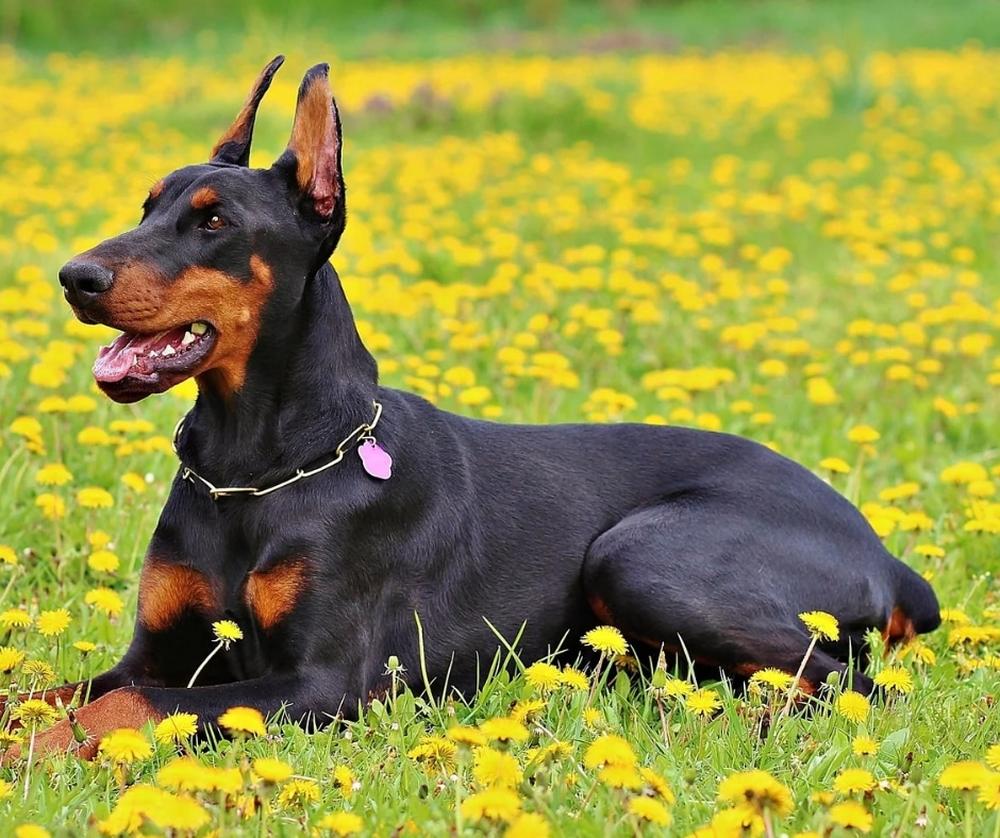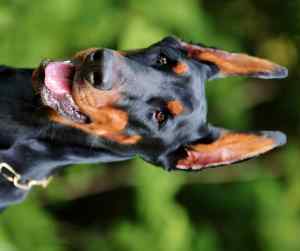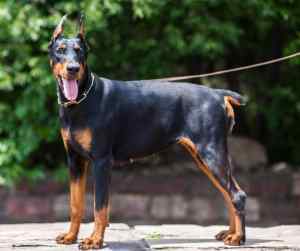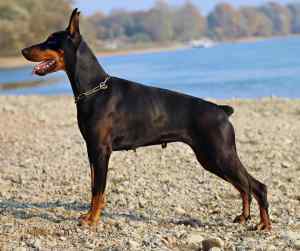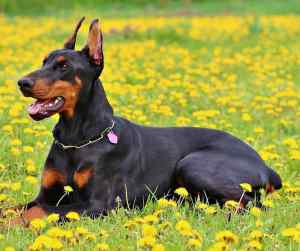- Doberman Pinschers
- All About the Doberman Pinscher Dog Breed
- Exploring the Doberman Pinscher A Brief History of the Breed
- Unveiling the Doberman Pinscher’s Distinctive Appearance
- Understanding the Doberman Pinscher’s Personality and Temperament
- Shedding Light on Common Health Issues in Doberman Pinschers
- Essential Care Tips for Your Doberman Pinscher
- Nourishing Your Doberman Pinscher A Guide to Proper Nutrition
- Keeping Your Doberman Pinscher Well-Groomed and Healthy
- Unleashing the Energy Exercise Needs of the Doberman Pinscher
- Mental Stimulation for the Doberman Pinscher Enrichment Needs
- Training Your Doberman Pinscher Tips and Techniques
- Is the Doberman Pinscher the Right Breed for You? Considerations to Make
- Conclusion Embracing the Doberman Pinscher as a Loyal and Loving Companion
All About the Doberman Pinscher Dog Breed
Welcome to our Doberman Pinscher dog breed information resource, a comprehensive online guide for those exploring the possibility of adding a Doberman Pinscher puppy to their family.
What does a Doberman Pinscher look like? What is the history of the Doberman Pinscher and where does it come from? What kind of temperament does this lively small dog breed possess?
Are Doberman Pinschers good with children? Does the breed have any special exercise or grooming needs? Where can I find healthy, home raised Doberman Pinscher puppies for sale from responsible, reputable Doberman Pinscher dog breeders?
We hope that you find your visit to Doberman Pinscher and Puppy Central to be both educational and enjoyable! Best of luck in your quest to find the perfect Doberman Pinscher puppy for your family.
Exploring the Doberman Pinscher: A Brief History of the Breed
The Doberman Pinscher, often referred to simply as the Doberman, is a breed that exudes elegance, strength, and loyalty. Developed in Germany by a tax collector named Louis Dobermann in the late 19th century, this breed was initially bred for protection and companionship. Dobermann aimed to create a dog that possessed the perfect combination of strength, agility, and intelligence. By crossing several breeds, including the Rottweiler, German Pinscher, and Weimaraner, he successfully created the Doberman Pinscher we know today.
Unveiling the Doberman Pinscher’s Distinctive Appearance
One of the most striking features of the Doberman Pinscher is its sleek and muscular build. With a well-proportioned body and a proud stance, this breed stands out in a crowd. The Doberman’s coat is short, smooth, and comes in various colors, including black, red, blue, and fawn. Their almond-shaped eyes are usually dark and alert, reflecting their intelligence and attentiveness. The Doberman’s ears are often cropped, giving them a distinctive and alert expression. However, it’s important to note that ear cropping is a personal choice and is not necessary for the health or well-being of the dog.
Understanding the Doberman Pinscher’s Personality and Temperament
Doberman Pinschers are known for their loyalty and devotion to their families. They are highly intelligent and eager to please, making them excellent candidates for obedience training. While they are often portrayed as aggressive or dangerous, this is a misconception. With proper socialization and training, Dobermans can be friendly and gentle companions. They are protective by nature and will go to great lengths to keep their loved ones safe. However, it’s important to note that early socialization is crucial to ensure they grow up to be well-rounded and confident dogs.
Shedding Light on Common Health Issues in Doberman Pinschers
Like any breed, Doberman Pinschers are prone to certain health issues. One of the most common concerns is dilated cardiomyopathy (DCM), a condition that affects the heart muscle and can lead to heart failure. Regular veterinary check-ups and screenings can help detect and manage this condition early on. Dobermans are also susceptible to hip dysplasia, a condition where the hip joint doesn’t develop properly, causing pain and mobility issues. Additionally, they may be prone to von Willebrand’s disease, a bleeding disorder. Responsible breeders conduct health screenings to minimize the risk of these conditions, so it’s important to choose a reputable breeder when getting a Doberman.
Essential Care Tips for Your Doberman Pinscher
Caring for a Doberman Pinscher involves providing them with a balanced diet, regular exercise, and proper grooming. Their short coat requires minimal grooming, but regular brushing helps keep their coat healthy and shiny. Dobermans are an active breed and require daily exercise to keep them physically and mentally stimulated. A tired Doberman is a happy Doberman, so engaging them in activities such as long walks, jogging, or playing fetch is essential. Additionally, providing them with puzzle toys or interactive games can help satisfy their need for mental stimulation.
Nourishing Your Doberman Pinscher: A Guide to Proper Nutrition
Proper nutrition is crucial for the overall health and well-being of your Doberman Pinscher. As an active breed, they require a high-quality diet that is rich in protein and balanced with fats and carbohydrates. Look for dog food that lists meat as the first ingredient and avoid fillers or artificial additives. Feeding your Doberman twice a day, rather than leaving food out all day, can help prevent obesity. It’s also important to monitor their weight and adjust their portion sizes accordingly. Consult with your veterinarian to determine the best diet plan for your Doberman based on their age, activity level, and any specific health concerns.
Keeping Your Doberman Pinscher Well-Groomed and Healthy
Maintaining your Doberman Pinscher’s overall health involves regular grooming and preventive care. Brushing their coat once or twice a week helps remove loose hair and keeps their coat shiny. Regularly check their ears for signs of infection or wax buildup, and clean them as needed. Trim their nails regularly to prevent overgrowth and discomfort. Dental hygiene is also important, so consider brushing their teeth regularly or providing dental chews to keep their teeth clean and healthy. Lastly, don’t forget to schedule regular veterinary check-ups and vaccinations to ensure your Doberman remains in optimal health.
Unleashing the Energy: Exercise Needs of the Doberman Pinscher
Doberman Pinschers are an energetic breed that requires ample exercise to keep them happy and healthy. They thrive in an active environment and need daily exercise to burn off their energy. A minimum of 60 minutes of exercise per day is recommended, but more is often better for this breed. Engaging them in activities such as running, hiking, or playing fetch not only helps them physically but also mentally stimulates them. Mental stimulation is just as important as physical exercise for Dobermans, so consider incorporating training sessions or puzzle toys into their routine to keep their minds sharp.
Mental Stimulation for the Doberman Pinscher: Enrichment Needs
Doberman Pinschers are highly intelligent dogs that thrive on mental stimulation. Without proper mental enrichment, they can become bored and may develop destructive behaviors. Training sessions are an excellent way to engage their minds and build a strong bond with your Doberman. Teaching them new tricks, obedience commands, or participating in dog sports such as agility or scent work can provide mental challenges and keep them engaged. Puzzle toys, treat-dispensing toys, and interactive games are also great options to keep their minds active and prevent boredom.
Training Your Doberman Pinscher: Tips and Techniques
Training a Doberman Pinscher is a rewarding experience that strengthens the bond between you and your dog. Due to their intelligence and eagerness to please, Dobermans are highly trainable. Positive reinforcement methods, such as using treats, praise, and rewards, work best with this breed. Consistency, patience, and firm but gentle guidance are key when training a Doberman. Start training early and focus on basic obedience commands such as sit, stay, and come. Socialization is equally important, so expose your Doberman to various people, animals, and environments from a young age to ensure they grow up to be well-adjusted and confident dogs.
Is the Doberman Pinscher the Right Breed for You? Considerations to Make
Before bringing a Doberman Pinscher into your life, it’s important to consider several factors. Dobermans are an active breed that requires a significant amount of exercise and mental stimulation. If you lead a sedentary lifestyle or have limited time to dedicate to exercise, this breed may not be the best fit for you. Additionally, Dobermans thrive on human companionship and can become anxious or develop behavioral issues if left alone for long periods. They are also protective by nature, which can be a positive trait but may require additional training and socialization to ensure they are well-behaved around strangers. Lastly, Dobermans are prone to certain health issues, so it’s important to be prepared for potential veterinary expenses.
Conclusion: Embracing the Doberman Pinscher as a Loyal and Loving Companion
The Doberman Pinscher is a breed that offers loyalty, intelligence, and companionship to those who are willing to invest time and effort into their care. With their distinctive appearance, loving temperament, and protective nature, Dobermans make excellent family pets and companions. By understanding their history, appearance, temperament, and specific care needs, you can provide your Doberman with the love and care they deserve. With proper training, socialization, and a balanced lifestyle, the Doberman Pinscher can become a loyal and loving companion that brings joy and happiness to your life for many years to come.

